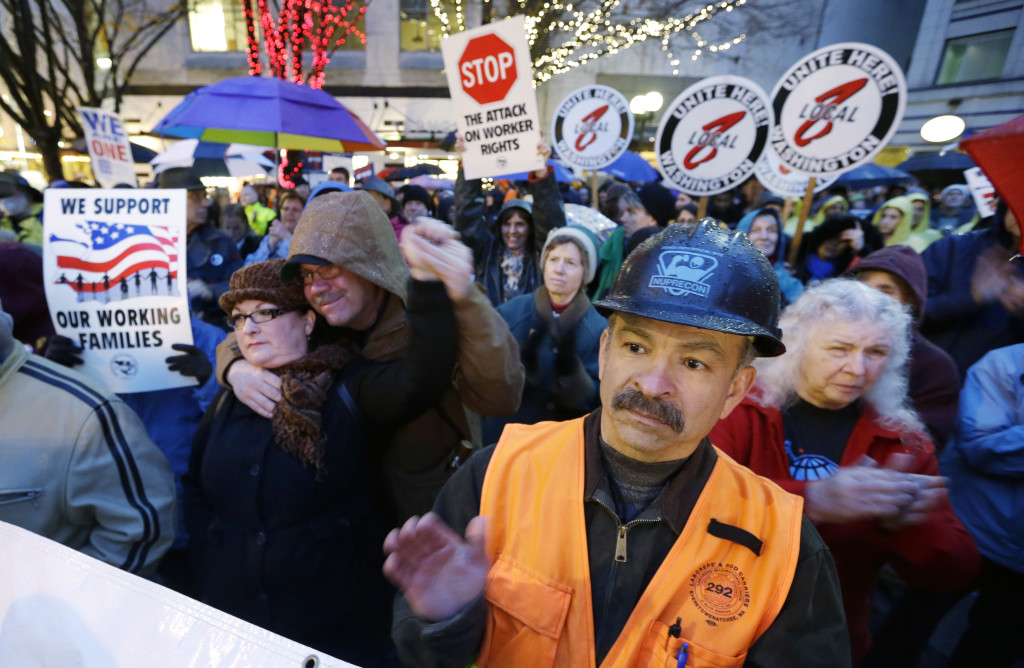Let’s fly back in time together to Flint, Michigan, 1960.
The city, about 60 miles north of Detroit, was booming. General Motors was founded in the city, and maintained several factories there. At the time, approximately 80,000 people worked for the company – producing the Buicks and Cadillacs that dominated America’s highways. Flint was crowded; it’s citizens were wealthy and the future looked bright, indeed.

Union workers and supporters cheer at a “Build it Here” rally Monday, Nov. 18, 2013, in downtown Seattle after contract negotiations with Boeing failed.
A return flight, to 2013. Flint, Michigan is a sorry shadow of its former self. Through the 70s and the 80s, the U.S. auto industry was collapsing and General Motors found itself getting crushed beneath the debris. Then-Chairman Roger Smith (CNBC would list him as one of the worst CEOs in American history and Michael Moore made a less-than-flattering film about him entitled “Roger and Me”) massively scaled back the company, shutting down the production in the area.
Within a few short months, Flint was dead.
General Motors’ pull from Flint destroyed the city financially. When the company rebuilt, it did so in Detroit. Detroit, too, now finds itself struggling in the wake of a fiscal crisis largely caused by failures of the company in recent years.
Flint’s remaining residents live largely in poverty. As the husk of a city continues to grasp for air, crime is rampant – it was named the most dangerous city in America in June.
What does Flint have to do with anything? Well, unfortunately, it could be a sign of things to come in Washington state. If Flint illustrated anything, it’s how essential industry is as the lifeblood of American communities. When that blood is drained, the shriveled corpse that remains can be thrown into a chaotic spiral.
In 2001, Boeing moved its corporate headquarters from Seattle to Chicago, though the headquarters for Boeing Commercial remain in Washington State.
Over the last few weeks, the Boeing Company has been involved in contentious contract negotiations with the Machinists Union over changes requested by the company in hopes of making the construction of its newest two planes – dually dubbed the 777X – in Everett. The Everett Herald reports that the project could directly add 20,000 jobs to the region. Production is set to begin in 2017.
Boeing requested that its Machinists shift their pensions into 401K plans, in addition to slowing the rate at which employees moved up the
pay scale.
Negotiations failed, calamitously.
According to Fox, the union reported that of its 31,000 area members, 67 percent rejected the proposed changes.
Boeing declared, “We chose to engage in Puget Sound first, but without full acceptance by the union and legislature, we will be left with no choice but to open up the process competitively and pursue other options for locating 777X work.”
Boeing assembles some of its 787s at a plant in Charleston, South Carolina. Many argued that the company would have no qualms in choosing to build the 777X there, where unions have much less clout than they do in the more liberal Washington State.
The Machinists, meanwhile, reacted extremely negatively to the offer. Several hundred commented on their local Facebook page that Boeing was only bluffing and that the contract changes were totally unnacceptable.
Tom Wrobleski, the head Machinists Local Union 751, reportedly called the proposed new contract “a piece of crap” and tore it up at the outset of negotiations earlier this month.
Things only escalated from there.
According to the Seattle Times, public opinion indicated that the majority of Washington area residents believed that the Machinists union should accept the changes, greatly fearing that Boeing’s exit from the area would have great economic harm in the region. On a live Twitter feed operated by the Seattle Times the night of the contract vote, one commenter, who didn’t work for Boeing, issued a heartfelt plea to union voters to accept the contract, fearing a plunge in the value of his Everett home if the company were to exit from the area.
Without Boeing, could Everett become Flint?
Likely fearing similar devastation, the state fought hard to convince Boeing to stay. Governor Jay Inslee was able to pass a package including several tax breaks and financial incentives worth approximately $9 billion for the company in hopes of enticing them to keep production in the state.
The morning after the union rejected the company’s vote, Boeing released a further statement, indicating their disappointment with the results and formally opening up the project to bidding from other states.
At this point, the primary frontrunner is the Charleston plant, though the company has several options.
One industry analyst, Scott Hamilton, argues that the future for Boeing in the Puget Sound area “looks bleak.” He cites CEO Jim McNerney’s frustration with the environment in Washington as a signal that over the next few decades the company will largely and slowly pul almost completely out of the state.
According to the Wall Street Journal, Emirates Airline earlier this week placed an order for 150 of the 777X planes, valued at around $76 billion. It’s the largest jetliner launch in history.
Multiple interested parties continue to push for the two sides to return to the negotiating table and eke out a deal. Boeing, for its part, has declared that it has no interest in sitting down with the Machinist’s again until at least 2016 and continues to court other areas.
South Carolina’s governor Nikki Haley additionally reported that she put in a phone call to Boeing, telling executives that “South Carolina is on standby and ready for you whenever you need them.”








